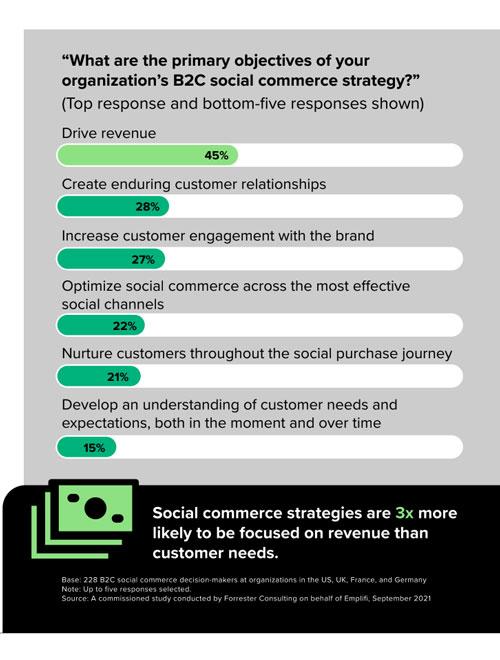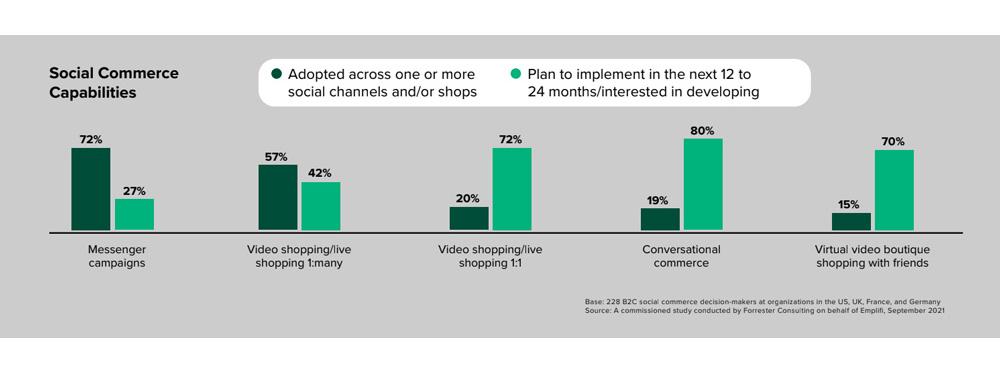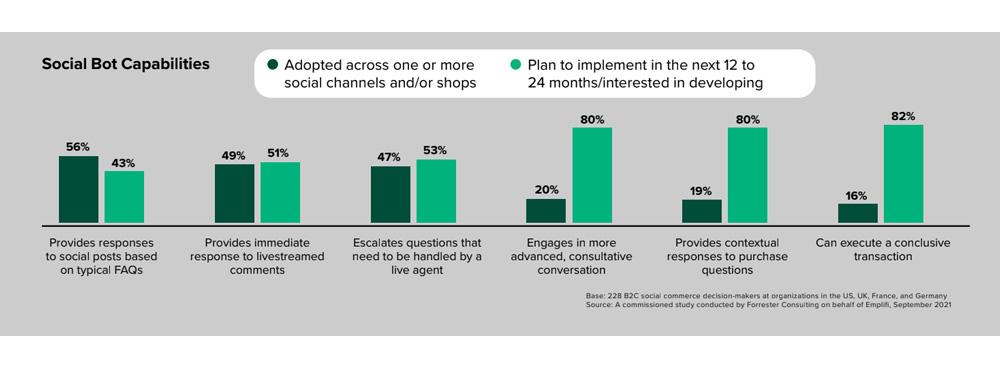What is the future of social commerce? As shopping on social platforms rises to new heights, B2C brands have mainly focused on driving revenue through their social media shops (or social shops, for short). In fact, social commerce strategies are 3x more likely to focus on revenue than on customer needs, according to a new commissioned study conducted by Forrester Consulting on behalf of Emplifi.
A major change is coming soon, however. Brands will reorient their social commerce strategies to elevate social media care, driven by the need to build long-term relationships and connect with shoppers through personalized experiences. Technology will play a key role in this transition, as more and more brands deploy advanced chatbots in their social shops that can handle sophisticated queries — and escalate to human agents when needed.
The Forrester study, Cashing in on Social Commerce, provides a data-driven perspective on how this transition will play out in the next 12 to 24 months. Let's dive into some insights from the study and see how brands can win the new, customer-centric era of social commerce.
The coming shift in social commerce
Grand View Research projects social commerce to have a growth of 28.4% CAGR from 2021 to 2028(1). As such, it is booming like never before, and is poised to grow even more in the years ahead.
Today, the majority of consumer brands are seeking to grow sales across social media platforms, with 83% investing in two or more social shops, according to the Forrester Consulting study.
What is a social shop?
Simply, it's where social media meets online shopping. Social shops enable brands to sell products directly to consumers through social media channels, and empower shoppers to browse products, seek support, purchase, and pay through their favorite social media channels.
What is the most common objective driving brands' social commerce strategies? According to the Forrester study, it's to drive revenue (45%). In contrast, only 15% of brands say one of their top five objectives is understanding customer needs and expectations. Similarly, fewer than 30% are focusing on creating enduring customer relationships or nurturing customers throughout the social purchase journey.

In short, brands today are primarily concentrating on revenue and growth, and do not appear to be emphasizing activities that could help them win and keep customers over time. However, as the study shows, these priorities will reverse in the near future as companies reach the limits of a revenue-first strategy and look for new ways to grow.
Social media care will become central to social commerce success
Many of the brands studied have already built up basic social commerce capabilities that address large audiences, such as messenger campaigns (72%) and one-to-many video shopping (57%). But as they look ahead toward the future, brands are considering ways to build one-to-one customer relationships by providing more personalized interactions throughout the entire journey.
For example, Forrester finds that more than 70% of brands plan to implement — or are interested in developing — capabilities for conversational commerce (80%), one-to-one live video shopping (72%), and virtual video boutique shopping with friends (70%) in the next 12 to 24 months. Such tools will enable brands to win customers by providing more personalized, interactive shopping experiences, recommendations, and guidance.

In this context, improved social media care is an essential way to create one-to-one relationships with people. Shoppers need the ability to access personalized support and service throughout their journeys—whether they are researching products, seeking to buy a product, or need assistance after the purchase. By meeting this need, brands can deliver more satisfying experiences and connect with shoppers in more enduring ways than just making a sale.
Of course, the need for a strong social media care structure also goes beyond purchase-driven experiences. For example, the UK’s largest dog welfare charity, Dogs Trust, has relied on a strong social media care structure to deliver informative and supportive content to their followers, and even to help them maximize their limited resources.
How will brands augment social media care within their social commerce strategies?
To provide effective care on social channels, brands need the ability to provide real-time responses to significant volumes of queries, around the clock. In addition, they need to provide truly personalized answers, guidance, and assistance, so that shoppers feel they are receiving high-quality care that meets their specific needs.
Advanced conversational technology will be key to providing such experiences at scale. Most brands, at the moment, are employing bots that can provide routine answers to basic questions. However, they cannot respond to more complex customer queries. This will change as more companies add AI-powered bots with advanced contextual and consultative abilities.
In the next 12 to 24 months, Forrester reports that the vast majority of B2C brands plan to implement or are interested in developing advanced social bots that can provide a higher level of assistance:
Execute conclusive transactions (82%)
Engage in more sophisticated, consultative conversations (80%)
Provide contextual responses to purchase questions (80%)

Such advances in automation will enable more effective and satisfying care throughout the customer journey — before, during, and after the purchase. In many cases, social bots will respond to queries that used to require a human agent. More and more, shoppers on social channels will be able to access personalized answers, recommendations, and resolutions to their problems, whenever they need help.
Nevertheless, even the most advanced bots will still encounter questions or problems that only a human can resolve. To deal with such situations, brands will need to deploy bots that give the ability to escalate complex cases to a live agent. Brand decision-makers understand the need for seamless solutions to this challenge: intelligent escalation of customer issues to a customer care agent is the top-ranked accelerator for social commerce success (59%), according to the Forrester study.
A customer-centric vision for social commerce
Social commerce is already proving its value, as global sales and revenue continue to grow at high rates. In the near future, it will become even more central for B2C companies, not only as a way of driving immediate revenue, but also as a tool for building strong and profitable customer relationships over time.
To achieve long-term success in social commerce, brands need to develop more customer-centric strategies and build the capabilities they currently lack. Above all, this means bolstering their ability to provide excellent care on social channels, using the right technology combined with the human touch.
For B2C digital commerce professionals with a social shop (or planning to start one), the latest data-driven insights can help you navigate the customer-centric future of social commerce. To explore in-depth, download the new Emplifi-commissioned study conducted by Forrester Consulting, Cashing in on Social Commerce.
(1) Source: “Social Commerce Market Analysis, 2017-2028, Opportunities Beyond COVID-19 Crisis,” Grand View Research © 2021 (https://www.grandviewresearch.com/industry-analysis/social-commerce-market/segmentation)
Follow Mayank Trivedi on LinkedIn.
























